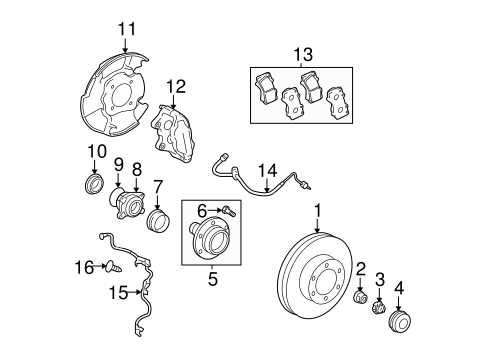
Exploring the intricate layout of your vehicle’s elements is essential for anyone looking to enhance their understanding or perform maintenance. A clear representation of the various components can provide invaluable insights, making repairs and modifications much more manageable.
Visual guides serve as a crucial tool for both seasoned mechanics and enthusiastic DIYers. By delving into these illustrations, one can easily identify the positioning and interconnection of the different elements, streamlining the repair process.
Whether you are troubleshooting an issue or upgrading certain features, having a reliable reference can significantly improve efficiency. Embracing this knowledge empowers vehicle owners to take charge of their automotive care, ensuring longevity and optimal performance.
Overview of 2007 Tacoma Parts
This section provides a comprehensive look at the components and elements that make up the model in question. Understanding the various elements is crucial for maintenance, repairs, and upgrades, ensuring optimal performance and longevity.
Key Components
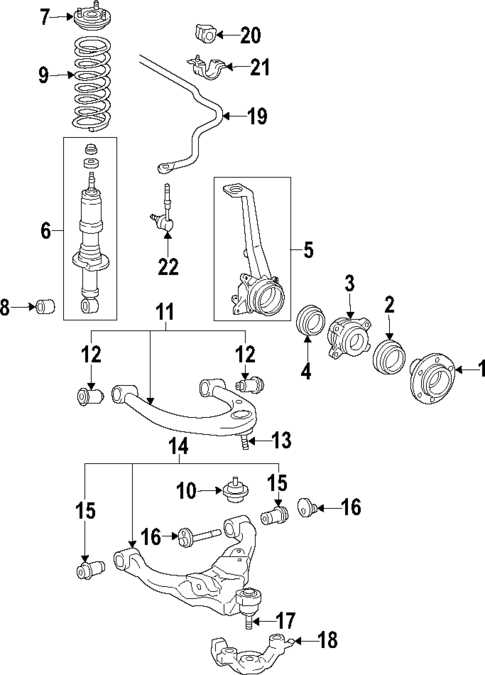
The fundamental elements include the engine assembly, transmission, and suspension system. Each plays a vital role in the overall functionality, contributing to the vehicle’s performance and handling capabilities.
Accessories and Upgrades
Enhancements such as aftermarket accessories can improve both aesthetics and functionality. Options for upgrades may include performance exhaust systems, enhanced braking systems, and custom wheels, which can elevate the driving experience.
Importance of Parts Diagrams
Understanding the intricacies of vehicle components is crucial for both maintenance and repair. Visual representations of these elements provide invaluable insights into their arrangement and function, enabling users to effectively diagnose issues and execute repairs.
Facilitating Maintenance
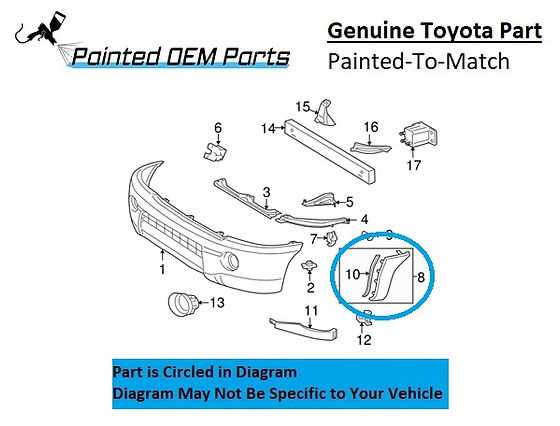
When attempting to maintain or service a vehicle, having a clear visual reference simplifies the process significantly. Here are some key benefits:
- Enhanced comprehension of component relationships.
- Streamlined identification of parts needing replacement.
- Improved efficiency in locating and accessing specific elements.
Supporting Repairs
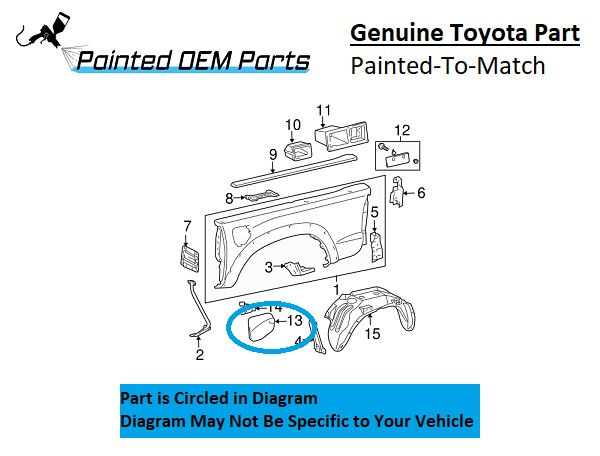
During repairs, accurate visuals play a pivotal role in ensuring successful outcomes. Consider the following advantages:
- Reduction of errors by providing precise location information.
- Increased confidence for both amateur and professional mechanics.
- Assistance in understanding complex assemblies and disassemblies.
Key Components of the Tacoma
This section highlights the essential elements that contribute to the overall functionality and performance of the vehicle. Understanding these components is crucial for maintenance and upgrades, ensuring optimal operation over time.
Essential Systems
The main systems that enhance the driving experience include the engine, transmission, and suspension. Each plays a vital role in the vehicle’s performance and durability.
Supporting Elements
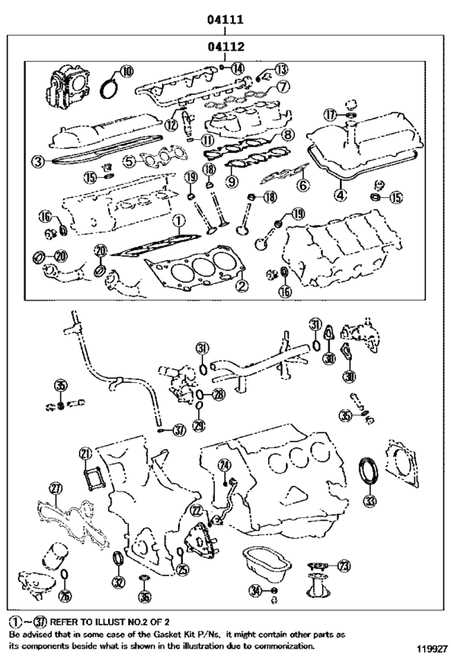
Additional components such as the braking system and electrical units are equally important. These parts ensure safety and efficiency, providing a reliable driving experience.
| Component | Function |
|---|---|
| Engine | Generates power for movement |
| Transmission | Transfers power from the engine to the wheels |
| Suspension | Ensures stability and comfort |
| Braking System | Provides stopping power |
| Electrical System | Powers lights, entertainment, and navigation |
Common Issues with 2007 Models
Owners of certain vehicles from this year often encounter a range of recurring challenges that can affect performance and reliability. Understanding these common problems is essential for effective maintenance and ensuring longevity.
Electrical System Troubles
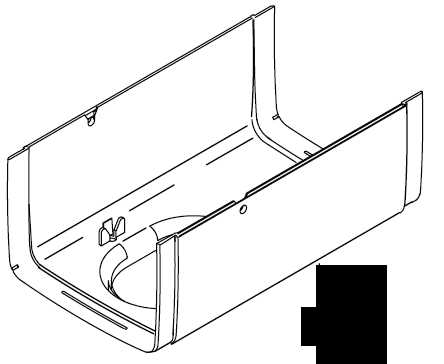
One frequent concern involves issues with the electrical system. Drivers may notice irregularities such as dimming headlights or malfunctioning gauges. These symptoms can indicate underlying wiring problems or a failing battery. Regular inspections can help prevent these complications from escalating.
Suspension and Steering Complaints
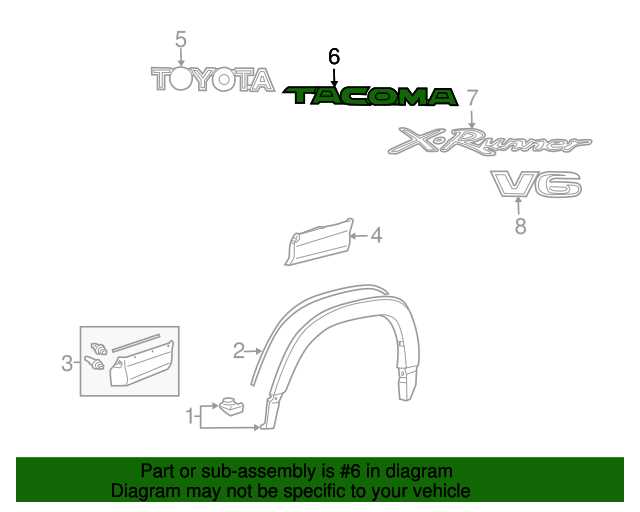
Another area of concern relates to the suspension and steering components. Many users report difficulties in steering responsiveness and increased vibrations while driving. These issues may arise from worn-out bushings or struts, which can compromise both comfort and safety. Addressing these concerns promptly is crucial to maintain optimal handling.
How to Read Parts Diagrams
Understanding visual schematics is essential for effectively identifying and locating components within a system. These illustrations serve as a guide, allowing users to navigate through various elements with ease.
To start interpreting these visuals, follow these key steps:
| Step | Description |
|---|---|
| 1 | Familiarize yourself with the overall layout and organization of the schematic. |
| 2 | Identify symbols and notations that represent different elements. |
| 3 | Use accompanying legends to clarify any unfamiliar markings. |
| 4 | Pay attention to the connections and relationships between various components. |
| 5 | Reference any additional resources or manuals for further insights. |
By mastering these techniques, you will enhance your ability to work with complex schematics and streamline your maintenance or repair tasks.
Finding Replacement Parts Online
In today’s digital age, sourcing components for your vehicle has become remarkably convenient. Numerous platforms cater to enthusiasts and owners alike, offering an extensive range of options to meet various needs. Whether you’re looking for original or aftermarket solutions, online resources can streamline the process and enhance your search experience.
Firstly, ensure that you have the correct specifications for the item you need. This knowledge will aid you in navigating different websites efficiently. Many online retailers provide detailed descriptions, allowing you to compare items effectively. Additionally, customer reviews can offer insights into product quality and compatibility.
Moreover, utilizing specialized forums and communities can be beneficial. Engaging with fellow vehicle owners often leads to valuable recommendations and tips for sourcing quality components. Participating in discussions may also reveal hidden gems and trustworthy suppliers that you might not encounter through typical search engines.
Finally, remember to check for return policies and warranties before finalizing your purchase. Understanding these terms can save you from potential frustrations if the item does not meet your expectations. With the right approach, finding suitable replacements online can be a seamless and rewarding experience.
Aftermarket vs. OEM Parts
When it comes to vehicle maintenance and repair, enthusiasts often face a critical choice: opting for original manufacturer components or exploring alternative options. Each category presents its unique advantages and potential drawbacks, influencing performance, reliability, and cost.
Original Equipment Manufacturer (OEM) components are produced by the vehicle’s manufacturer, ensuring a precise fit and adherence to factory specifications. These parts often provide peace of mind, as they meet the stringent quality standards set by the brand.
On the other hand, aftermarket options come from third-party manufacturers and can vary widely in quality and price. While some alternatives may offer enhanced performance or unique features, others might compromise on durability or compatibility. It’s essential to research and select reputable sources when considering these components.
Ultimately, the decision between OEM and alternative options hinges on individual priorities, whether it be quality assurance or budget considerations. Understanding the pros and cons of each can lead to a more informed choice, aligning with the specific needs of your vehicle.
Maintenance Tips for Tacoma Owners
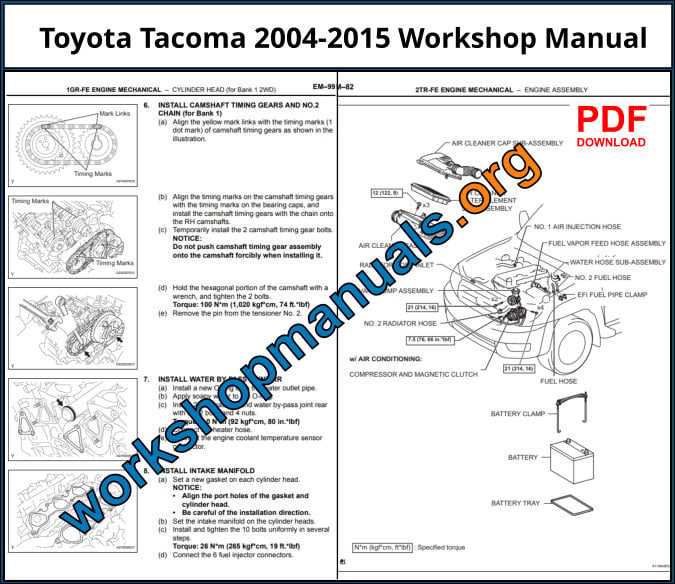
Proper upkeep is essential for ensuring the longevity and performance of your vehicle. Regular attention to various components can prevent issues and enhance your driving experience. Here are some key recommendations for maintaining your ride.
Regular Inspections
- Check fluid levels frequently, including oil, coolant, and brake fluid.
- Examine tire pressure and tread depth to ensure optimal safety and efficiency.
- Inspect belts and hoses for signs of wear or damage.
Scheduled Maintenance
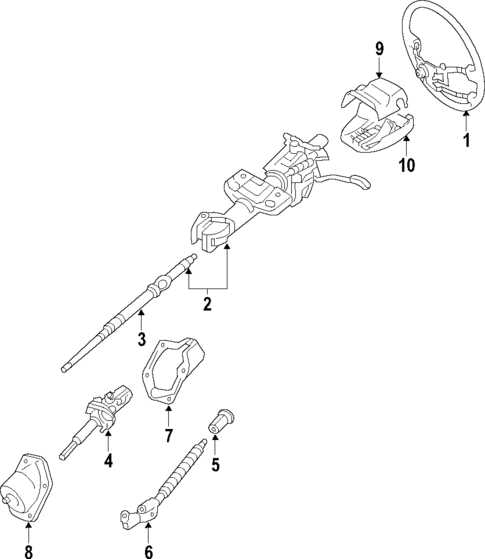
- Follow the manufacturer’s recommended service intervals for oil changes and filter replacements.
- Rotate tires every 5,000 to 7,500 miles to promote even wear.
- Keep an eye on brake components and replace them as necessary to maintain safety.
By adhering to these guidelines, you can enjoy a reliable and efficient vehicle that serves you well for years to come.
Identifying Parts by VIN
Understanding how to accurately identify components for your vehicle is crucial for maintenance and repairs. Utilizing the Vehicle Identification Number (VIN) can streamline this process, ensuring that you acquire the correct items tailored to your specific model and year.
What is VIN?
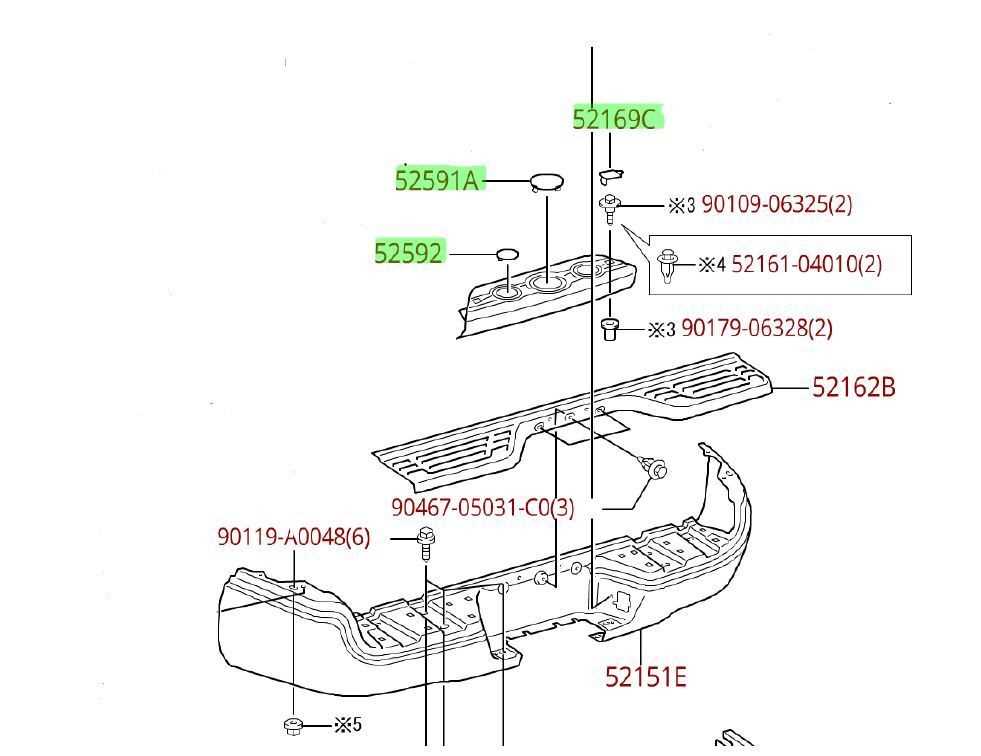
The VIN is a unique code that serves as an identification for your automobile. It is typically found on the dashboard near the windshield or inside the driver’s side door. This code contains vital information about the vehicle, including its manufacturer, model, and production year.
How to Use VIN for Parts Identification
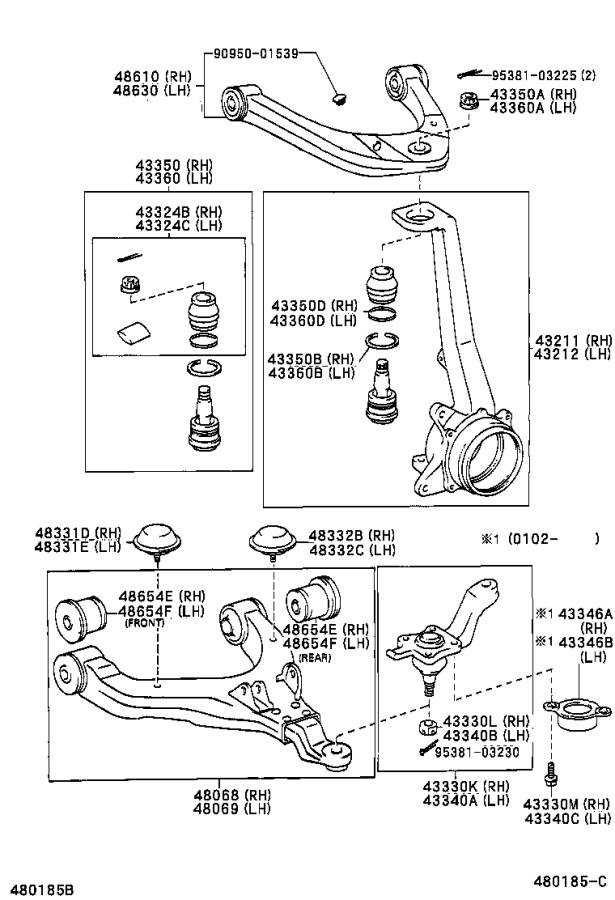
To effectively use the VIN, locate it and enter it into a reliable online parts catalog or consult with a dealer. This will provide you with a comprehensive list of compatible components, ensuring you select the correct replacements for your specific vehicle configuration.
Benefits of Using Parts Diagrams
Utilizing visual representations of components in vehicles can significantly enhance the understanding and efficiency of maintenance tasks. These illustrations provide a clear overview of how different elements fit together, aiding in both identification and assembly processes.
Improved Clarity
Visual aids eliminate confusion by offering a detailed view of each element’s location and function. This clarity ensures that technicians can quickly locate and address specific areas without unnecessary guesswork.
Time Efficiency
Having access to organized visuals can streamline repair efforts. When workers can easily reference an image showing the layout, they reduce the time spent searching for parts, ultimately increasing productivity.
Resources for Tacoma Parts
Finding quality components for your vehicle can be a daunting task. Fortunately, there are numerous platforms and services dedicated to helping enthusiasts and owners locate the right items efficiently. These resources cater to various needs, from original equipment to aftermarket alternatives, ensuring that you can maintain or upgrade your ride without hassle.
Online Marketplaces
Many websites specialize in automotive components, offering a vast selection for different models. Popular platforms often feature user reviews and ratings, allowing you to make informed decisions. Additionally, some sites provide detailed specifications and compatibility information to assist in your selection process.
Local Auto Parts Stores
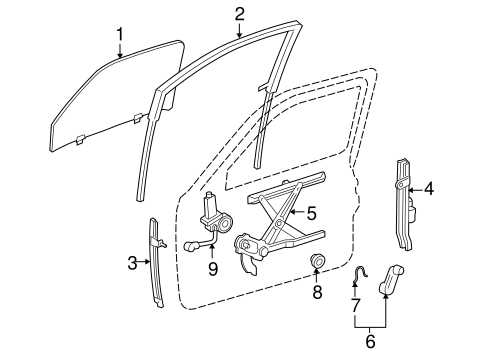
Visiting local retailers can be beneficial for hands-on assistance and immediate access to necessary components. Knowledgeable staff members can guide you through available options and may even help you find specific items that meet your requirements. Moreover, many stores offer the possibility to order parts that might not be in stock, ensuring you get exactly what you need.
Understanding Warranty on Parts
When it comes to vehicle components, knowing the coverage options available can be crucial for maintaining functionality and value. Warranty agreements provide essential information on what is protected, the duration of coverage, and the conditions under which claims can be made. Understanding these aspects helps consumers make informed decisions about replacements and repairs.
Typically, warranties can vary significantly based on the manufacturer and the type of component. Some may offer limited coverage for specific conditions, while others might encompass a broader range of issues. It’s vital to review the warranty terms carefully to understand your rights and obligations.
| Type of Coverage | Duration | Conditions |
|---|---|---|
| Manufacturer Warranty | 1-3 years | Defects in material or workmanship |
| Extended Warranty | Up to 5 years | Specific wear and tear |
| Aftermarket Warranty | Variable | Installation by certified technicians required |
In summary, a thorough comprehension of warranty terms not only safeguards your investment but also ensures that you have the necessary support should any issues arise with your vehicle’s components.